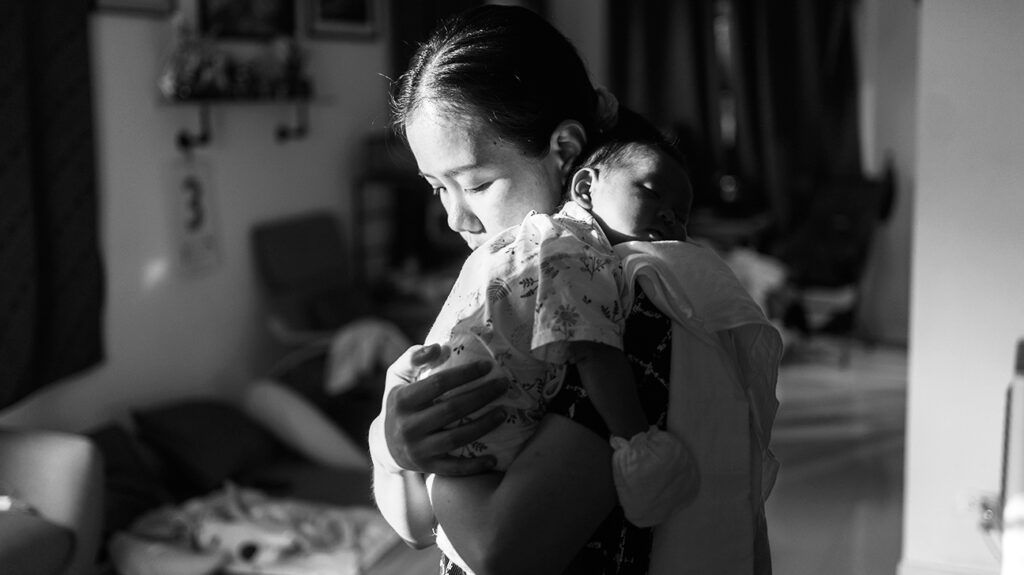People with postpartum bipolar disorder have severe high and low shifts in their mood after giving birth. Pregnancy can increase the risk of complications with bipolar disorder.
Bipolar disorder (BD) is a mental health condition. It causes atypical shifts in mood, energy, and concentration that can affect a person’s daily life.
There are several BD types. If a person receives a BD diagnosis in the recovery period after giving birth, this is known as postpartum bipolar disorder (PPBD).
Pregnancy may worsen a person’s BD symptoms and increase their risk of some complications. However, several treatments can help manage PPBD.
This article discusses what causes postpartum bipolar disorder, PPBD versus postpartum depression, and whether PPBD can lead to bipolar disorder. It also discusses PPBD symptoms and treatments.

If a person receives a diagnosis of bipolar disorder in the recovery period after pregnancy, this is known as postpartum bipolar disorder.
People with BD have a
Researchers do not currently know
- issues with the brain’s:
- chemistry
- structure
- functioning
- issues with a person’s genetics
People with BD often develop it in their mid-20s. They may have several episodes of symptoms that come and go over months or years. This can lead to people having BD episodes at the same time as multiple pregnancies and childbirth.
A pregnant person
Postpartum depression
Many pregnant people feel sad, worried, or tired within a few days of giving birth. For some, these feelings go away in a few days.
A person may have postpartum depression (PPD) if they feel sad, hopeless, or anxious for longer than
These feelings may be mild to severe and can interfere with a person’s daily life. About
PPD is a serious mental health condition. It may affect a person’s parenting ability and development of the baby. However, there are effective treatments available. If a person is experiencing symptoms of PPD, they need to speak with a healthcare professional.
Learn more about postpartum depression.
Postpartum bipolar disorder
According to 2017 research, 21.4% to 54% of women with PPD may also have BD. Many individuals who receive a diagnosis of PPD may actually have BD instead.
Pregnant people with BD may
Which is more severe?
People with PPBD may have a
- hallucinations
- delusions
- confusion
A person with PPBD may also have a
Can postpartum depression lead to bipolar disorder?
Having a history of PPD
Symptoms of PPBD
Symptoms of manic episodes may include:
- feeling very joyful or extremely irritable or touchy
- feeling more active than usual or jumpy
- needing less sleeptalking fast about many things
- racing thoughts
- feeling able to do many things at once without becoming tired
- having an excessive appetite for activities such as food, drink, or intercourse
- feeling unusually powerful, talented, or important
Symptoms of depressive episodes may include:
- feeling very down, sad, or anxious
- feeling slowed down or restless
- having difficulty getting or waking up from sleep
- sleeping a lot
- talking very slowly
- feeling unable to find anything to say
- forgetfulness
- trouble concentrating or making decisions
- feeling unable to do simple things
- having a lack of interest in nearly all activities
- feelings of hopelessness or worthlessness
- suicidal thoughts
Suicide prevention
If you know someone at immediate risk of self-harm, suicide, or hurting another person:
- Ask the tough question: “Are you considering suicide?”
- Listen to the person without judgment.
- Call 911 or the local emergency number, or text TALK to 741741 to communicate with a trained crisis counselor.
- Stay with the person until professional help arrives.
- Try to remove any weapons, medications, or other potentially harmful objects if it’s safe to do so.
If you or someone you know is having thoughts of suicide, a prevention hotline can help. The 988 Suicide and Crisis Lifeline is available 24 hours a day at 988. During a crisis, people who are hard of hearing can use their preferred relay service or dial 711 then 988.
A person may also have episodes of mixed symptoms. People with some forms of BD may have hypomania, a less severe form of manic episodes.
Although people with PPBD can have both high and low episodes,
A pregnant person with BD may also experience more severe BD symptoms. These can lead to an
Learn more about common symptoms of bipolar disorder.
Treatment options for PPBD can help people to have fewer mood episodes. They
- psychotherapy
- electroconvulsive therapy
- care in a healthcare facility
They also include medication, including:
However, some PPBD medications are not safe for a pregnant person. A person who is pregnant and has BD needs to discuss treatment options with a healthcare professional.
Learn more about treatments for bipolar disorder.
The following are answers to some questions people frequently ask about postpartum bipolar disorder.
What is postpartum mania?
Postpartum mania is when a person experiences periods of feeling overactive, restlessness, or uninhibited during the period after giving birth. People with BD may have a higher risk of having postpartum mania episodes.
What age does bipolar start in females?
The average age for the onset of BD in most people is 25 years old.
Bipolar disorder resources
Visit our dedicated hub for more research-backed information and in-depth resources on bipolar disorder.
People with postpartum bipolar disorder (PPBD) experience new or worsened bipolar disorder symptoms in the period after giving birth. They generally have episodes of very high and very low moods that can severely affect their daily life.
Researchers do not currently know the exact cause of PPBD. However, there are effective treatments to help a person with PPBD experience fewer mood episodes and manage the condition.
